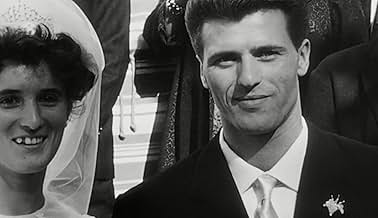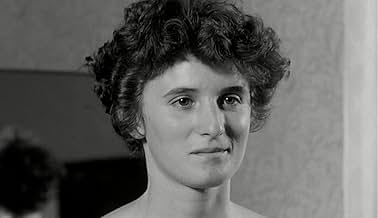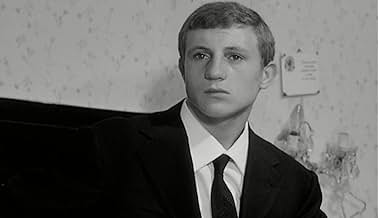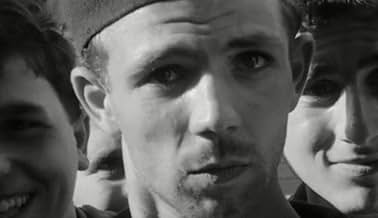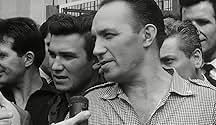CALIFICACIÓN DE IMDb
7.5/10
2.8 k
TU CALIFICACIÓN
Pier Paolo Pasolini entrevista a los italianos de 1963 sobre el sexo, el matrimonio y los roles de género.Pier Paolo Pasolini entrevista a los italianos de 1963 sobre el sexo, el matrimonio y los roles de género.Pier Paolo Pasolini entrevista a los italianos de 1963 sobre el sexo, el matrimonio y los roles de género.
Io Appolloni
- Self - Girl at Lido with Swimming Cap
- (sin créditos)
Graziella Chiarcossi
- Graziella the Bride
- (sin créditos)
Graziella Granata
- Self - Girl at Lido with Long Hair
- (sin créditos)
Pier Paolo Pasolini
- Self - Interviewer
- (sin créditos)
Opiniones destacadas
Saw this beautifully preserved/restored print, with subtitles, via YouTube. Pasolini, with his reputation for political and every other form of radicalism, seems inhibited here, even in the discussion segments with Alberto Moravia and Cesare Musatti. The man-and-woman (and children, students)-in-the-street-and-on-the-farm interviews seem dated, probably since the interviews were conducted on the cusp of major changes in marital and family laws, policies, sexual attitudes in Italy and elsewhere. While no groundbreaking documentary, it's still a fascinating document of the time and place. A more daring and cinematically imaginative treatment of similar themes is found in, of course, "I am Curious (Yellow)"(1967) and "I am Curious(Blue)"(1968), directed by Vilgot Sjoman (a former UCLA film student). In those days there were things you could do in Sweden, albeit with censorship problems, that were simply impossible in Italy, period.
Comizi d'amore (1965)
*** (out of 4)
Pasolini travels around Italy throwing a mic into various ranges of people asking frank and honest questions about sexuality. Various topics ranging from homosexuality, prostitutes, divorce, sexual freedom and even asking kids where babies come from. The type of people range from college students to the rich and poor and to women who normally can't speak openly. I'm sure this film was more of a sensation when originally released but I think it holds up quite well today for several reasons. For one, it's interesting to look back over forty-years ago and see how young people at the times thought about sex but also how the older people back then looked back on the moral and religious rules of their youth. The film also holds up well today because things really haven't changed too much whenever you really break down the groups of people like Pasolini did. I'm not sure is there was a point to this documentary as it seems like the director simply wanted to know what the country felt on certain issues. There's a lot of humor to be found in the film but most of this comes from the answers the children give about where babies come from. The most interesting thing, knowing that the director was gay, is him asking people about homosexuality and the answers they give him. Most people reply with disgust and I kept wondering if the director would crack and say something but he never does. I think the film goes on a bit too long but it's an interesting look at sexuality on moral and religious aspects.
*** (out of 4)
Pasolini travels around Italy throwing a mic into various ranges of people asking frank and honest questions about sexuality. Various topics ranging from homosexuality, prostitutes, divorce, sexual freedom and even asking kids where babies come from. The type of people range from college students to the rich and poor and to women who normally can't speak openly. I'm sure this film was more of a sensation when originally released but I think it holds up quite well today for several reasons. For one, it's interesting to look back over forty-years ago and see how young people at the times thought about sex but also how the older people back then looked back on the moral and religious rules of their youth. The film also holds up well today because things really haven't changed too much whenever you really break down the groups of people like Pasolini did. I'm not sure is there was a point to this documentary as it seems like the director simply wanted to know what the country felt on certain issues. There's a lot of humor to be found in the film but most of this comes from the answers the children give about where babies come from. The most interesting thing, knowing that the director was gay, is him asking people about homosexuality and the answers they give him. Most people reply with disgust and I kept wondering if the director would crack and say something but he never does. I think the film goes on a bit too long but it's an interesting look at sexuality on moral and religious aspects.
Pier Paolo Pasolini always has a streak of the documentary filmmaker somewhere in his body of work, where he usually went for expressing his poetic viewpoint on the lower classes (i.e. Mamma Roma) and, later on, the dark fables and tawdry tales of Oedipus Rex and Arabian Nights. If Love Meetings, his only straight documentary feature, isn't completely impressive it may be because in the little moments when he tries for something poetic, oddly enough, like in the numbered transitions, it doesn't really work as well. Those little bits come off as dated 60s stuff. On the contrary though when Pasolini simply takes to the street with a 16mm and a microphone and asks people directly about sex and women's roles and homosexuality and fidelity and freedoms related to all of the above then it gets really interesting. In fact, for a movie relegated to Italian cities and countrysides, with sound-bytes from across the spectrum from college kids to professors (and author Alberto Moravia early on) to farmers in the fields, and done so on the fly and in classic cinema verite style, it doesn't usually feel very old fashioned.
Much of what's discussed and dug up by Pasolini (who reveals himself wonderfully here as a solid journalist, something I would have liked to have seen more of in his career after seeing this) can be relatable for today's youth, if only as a cohesive set of opinions and viewpoints and occasional factoids on standards set between men and women and privacy and liberation and so on. To be sure some of it is stuck in its time and place (practically all of the children asked "Where do babies come from?" say the stork, or something involving God or other). But a lot of it is so absorbing because of the generous flow of ideas- it's a wonderfully edited piece, as sometimes crudely constructed as it is, which is part of the point as a true independent production- and Pasolini's determination to get as much as he can at the heart or whatever at sexual relations and societal norms and what's changed over time in Italy and if there can be any more change in the future. It's probably the most obvious example from the director to screen in a sociology class. 8.5/10
Much of what's discussed and dug up by Pasolini (who reveals himself wonderfully here as a solid journalist, something I would have liked to have seen more of in his career after seeing this) can be relatable for today's youth, if only as a cohesive set of opinions and viewpoints and occasional factoids on standards set between men and women and privacy and liberation and so on. To be sure some of it is stuck in its time and place (practically all of the children asked "Where do babies come from?" say the stork, or something involving God or other). But a lot of it is so absorbing because of the generous flow of ideas- it's a wonderfully edited piece, as sometimes crudely constructed as it is, which is part of the point as a true independent production- and Pasolini's determination to get as much as he can at the heart or whatever at sexual relations and societal norms and what's changed over time in Italy and if there can be any more change in the future. It's probably the most obvious example from the director to screen in a sociology class. 8.5/10
I too was disappointed, but not for the reasons cited in the previous comment.
Instead, I found the film very hard to follow, with lots of academic buzzwords (interviewer Pasolini refers to "the sex problem" at least 20 times), not all of it subtitled, and subtitles that faded out of legibility against light backgrounds.
The movie was visually unappetizing, in part because of inconsistent and often inept camera work, and in part because of a sloppy transfer to tape that washed out the middle tones and often made it hard to see and read people's faces.
The most annoying element was the recurrent muting of the voice tracks (and of course the accompanying sub-titles) that was labeled "self-censorship." Was this a comment on official censorship of the time? I get the impression that the most interesting answers were lost to the audience through this process.
An interesting and meaty idea from a provocative and often great filmmaker, undercut by directorial inexperience and poor repackaging.
Instead, I found the film very hard to follow, with lots of academic buzzwords (interviewer Pasolini refers to "the sex problem" at least 20 times), not all of it subtitled, and subtitles that faded out of legibility against light backgrounds.
The movie was visually unappetizing, in part because of inconsistent and often inept camera work, and in part because of a sloppy transfer to tape that washed out the middle tones and often made it hard to see and read people's faces.
The most annoying element was the recurrent muting of the voice tracks (and of course the accompanying sub-titles) that was labeled "self-censorship." Was this a comment on official censorship of the time? I get the impression that the most interesting answers were lost to the audience through this process.
An interesting and meaty idea from a provocative and often great filmmaker, undercut by directorial inexperience and poor repackaging.
Pasolini's informal interviews with Italians about sexual matters doesn't make for a perfect study or a perfect documentary, but it does provide an interesting window into the time period, and it was pretty unique as well. The people he talks to seem to provide a pretty good sample, including those from many regions in Italy and across various categories - men/women, old/young, city/rural, college educated/blue collar, and conservative/liberal. As most of his interviews are conducted in big groups and what appear to be impromptu meetings I don't think it was all that scientific, and wondered how many things were left unsaid out of social pressure. However, in the end I felt like people hadn't been shy with expressing their opinions, and a picture was painted of a changing country - the deeply conservative aspects gradually facing inevitable progress.
The questions that Pasolini seemed most concerned with were:
Is sex important? Are young girls as free as young boys? Should a woman be a virgin when she gets married? Does marriage solve the "sexual issue"? What do you think of sexual "abnormality"? (by this he means, argh, homosexuality) Should divorce be legalized in Italy? (it wasn't possible in the country until 1970)
It's a little tough to hear some of the answers, e.g. about how women are inferior and shouldn't be allowed to work or even go out to a café alone, how a woman should be killed if she commits adultery instead of divorced (to lots of jokes and smiles!), or how homosexuals are disgusting and should be "cured." It was also a little tough to hear Pasolini push so much for prostitution, asking young women workers why they don't make a lot more money by selling themselves, not thinking to interview a prostitute about the significant dangers of her profession or the emotions involved with selling one's body. Similarly, he doesn't interview someone who is gay, even with their identity concealed. His questions often reflect the patriarchy and conformity, making it a window into Pasolini in addition to the window into Italy, and I say that knowing his orientation.
I don't fault the film too much for these things because it's reflecting the society in 1964, and I'm happy times have changed. If a documentary was made about values today, I'm certain that when viewed over half a century later we, too, would collectively appear backward (hell, we appear pretty backward even today :). It was also a pleasure to hear answers which were real gems, a lot of times from young women, professing a desire for equality between the sexes, an end to the outmoded double standard, and practicality in allowing divorce. In a couple of places a clear link is formed between poverty and some of the archaic attitudes, which I found fantastic. That included one guy explaining that sexual harassment at work is a problem thusly:
Man on street: "Freedom is conquered through work. In Germany, they work from when they're 12 to old age. ... In Palermo, if a woman goes to work, her brother grabs her and says, 'Where are you off to?' 'To work.' 'You can't go. The boss will harass you.' Do you understand?" Pasolini: "And so you agree that if economic conditions changed in Palermo..." Man on street: "When employers learn how to behave with girls! Only then! When employers are polite towards women."
Pasolini then idiotically says "but the boss can't have sex with one hundred workers," which even if he's playing devil's advocate is a flawed argument in several respects and which leads to a response that goes down the rathole, that yes indeed, here in Sicily one or two women a day could be easily done. These are the kinds of things you put up with in Love Meetings.
The questions that Pasolini seemed most concerned with were:
Is sex important? Are young girls as free as young boys? Should a woman be a virgin when she gets married? Does marriage solve the "sexual issue"? What do you think of sexual "abnormality"? (by this he means, argh, homosexuality) Should divorce be legalized in Italy? (it wasn't possible in the country until 1970)
It's a little tough to hear some of the answers, e.g. about how women are inferior and shouldn't be allowed to work or even go out to a café alone, how a woman should be killed if she commits adultery instead of divorced (to lots of jokes and smiles!), or how homosexuals are disgusting and should be "cured." It was also a little tough to hear Pasolini push so much for prostitution, asking young women workers why they don't make a lot more money by selling themselves, not thinking to interview a prostitute about the significant dangers of her profession or the emotions involved with selling one's body. Similarly, he doesn't interview someone who is gay, even with their identity concealed. His questions often reflect the patriarchy and conformity, making it a window into Pasolini in addition to the window into Italy, and I say that knowing his orientation.
I don't fault the film too much for these things because it's reflecting the society in 1964, and I'm happy times have changed. If a documentary was made about values today, I'm certain that when viewed over half a century later we, too, would collectively appear backward (hell, we appear pretty backward even today :). It was also a pleasure to hear answers which were real gems, a lot of times from young women, professing a desire for equality between the sexes, an end to the outmoded double standard, and practicality in allowing divorce. In a couple of places a clear link is formed between poverty and some of the archaic attitudes, which I found fantastic. That included one guy explaining that sexual harassment at work is a problem thusly:
Man on street: "Freedom is conquered through work. In Germany, they work from when they're 12 to old age. ... In Palermo, if a woman goes to work, her brother grabs her and says, 'Where are you off to?' 'To work.' 'You can't go. The boss will harass you.' Do you understand?" Pasolini: "And so you agree that if economic conditions changed in Palermo..." Man on street: "When employers learn how to behave with girls! Only then! When employers are polite towards women."
Pasolini then idiotically says "but the boss can't have sex with one hundred workers," which even if he's playing devil's advocate is a flawed argument in several respects and which leads to a response that goes down the rathole, that yes indeed, here in Sicily one or two women a day could be easily done. These are the kinds of things you put up with in Love Meetings.
¿Sabías que…?
- ConexionesEdited into Lo schermo a tre punte (1995)
Selecciones populares
Inicia sesión para calificar y agrega a la lista de videos para obtener recomendaciones personalizadas
- How long is Love Meetings?Con tecnología de Alexa
Detalles
Taquilla
- Total a nivel mundial
- USD 2,789
- Tiempo de ejecución1 hora 32 minutos
- Color
- Mezcla de sonido
- Relación de aspecto
- 1.85 : 1
Contribuir a esta página
Sugiere una edición o agrega el contenido que falta

Principales brechas de datos
By what name was Encuesta sobre el amor (1964) officially released in India in English?
Responda

